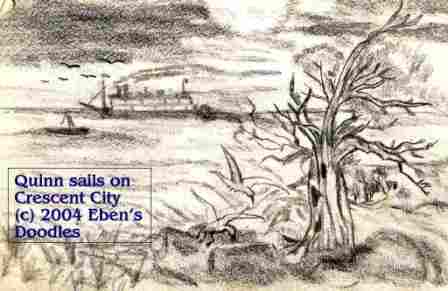

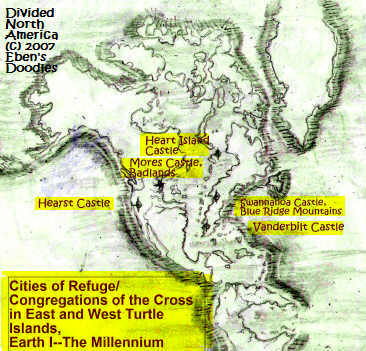
They, and nations on the continent of Atlantis II, allied and divided into two main camps, had suffered the nuclear Gotterdammerung that settled once and for all that none of them would survive to rule the earth as a victor. What was there left to rule anyway, when the billowing, death-spewing clouds had dissipated their lethal dust and radiation over the whole inhabited earth and the wildernesses to the extreme north and extreme south?
Yet life, even human life, goes on somehow, after the greatest disasters imaginable seem to render life, and particularly civilization, impossible. Tribal peoples especially fared better, having far less to lose in the general destruction of technological civilization.
Though the great cities had been reduced to radioactive ashes, there was still plenty land left to re-occupy.
Multitudes that once occupied vast areas perished, once their sustenance in the urban centers disappeared--they had no means of keeping their commercial farms and businesses going--there was no use for money, once the banks had been eliminated, and without money as a basis how could barter do what money had once done? The tribes could barter and adjust, but urban society could not, and so it perished.
It was sad beyond saying, but the earth had known times like that before, and time brings healing of a sort, thanks to the forgetfulness that a lengthening distance from the events inevitably brings.
How terrible exactly was the time of Homer Bean? Nobody knew anymore, since the younger generations could not fathom such things as flying arrows so powerful they could destroy millions of people wherever they struck into the earth. Worse still, they poisoned the earth for generations, and in some places, anyone who as much as walked through, died--so that no one could live there anymore. Why would anyone want to fashion such evil things anyway?
No one afterwards could understand the reason.
It was best to forget the whole thing and move to the cleaner, safer spots, and tend to things like growing corn, hunting, fishing. As long as they kept avoiding the evil places like abandoned, destroyed cities that made people sick, even killed them, if they ventured into them. they could manage, they learned.
Yet even for health reasons, it was impossible to avoid all the ruins that could poison and kill people. They were everywhere, often solitary, but mostly spread over vast areas of the earth. Sometimes the tribes found shelter in them, and that gave them a reason to use them even if they might not be the healthiest places to live.
One such place was the Ceylon Nuclear Power Plant, which, fortunately, had been shut down for security sake just before a missile (non-nuclear) killed all its personnel and made it a site for possible re-occupation by some tribal people looking to find old hunting and fishing grounds.
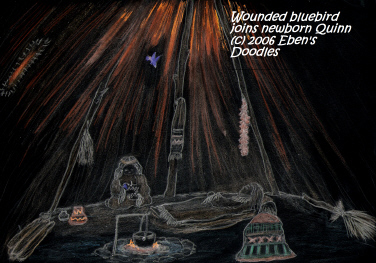
With such a set-back, his mother could not bear to keep him, for her thinking had gone bad during the hard childbirth. She took the infant and abandoned him.

When she was able, the mother gave her son two names, for he was a chief's son. His head was adorned with strange glowing patches, formed almost like seeing eyes, and so she named him first Five Stars. Then she saw the bird. His second name was the bird's, the Bluebird. Yet the child grew up with three names, and more. Quinn was the name his father gave him, not wanting to start with Five Stars or Bluebird when he called his son to him in the clan lodge. As for the boy's hurt leg, the father hoped he might grow out the injury the midwives had given him or respond to one of his sand paintings and chants for healing. He had no idea, of course, that this too was a special gift from the Great Weaver.
The tribe (or, tribes, since Lakota and Shos-Shone shared territories in the south) had seen a number of great changes in the land. A sea had come up when the whole back of the Turtle and Bear split north to south. The Brazos, it had been called in times past, was shortened considerably. Now it poured into the Turtle Sea, as the "N ew Sea" came to be called. Yet the name of the lodging ground remained "Ceylon," a most ancient name in a land once called "Publicatexa," though not even the tribal elders knew of that old name and the country it represented. The ancients, though not Shos-shone, had built a large, hoop-ceilinged lodge there, using their cunning and craft to send powerful medicine through steel threads miles long. The lodge used much water to cool its medicine machine, but now it used none, and the water was as clean and cool as it could be. In the front of it the clan had erected their own tents, which in time were made, many of them, into more permanent lodges, which were kept nice and dry and out of the rain and wind by the overhanging lodge's entrance.
"Quinn Ceylon" naturally attached came to mind when people thought of the chief's son. If they wished, they could use his other names, but he was most commmonly called Quinn or Quinn Ceylon.
As for his five-stared head, it was not generally know, for the family did not want the child turned out of the tribe.. Bluebird, they knew, but it was least used. To most all, he was simply "One Legged," because of his hopping walk.
Years passed at the Ceylon lodge. It was a beautiful place, and his father was very busy, attending to councils held there for the entire clan. A large tree grew up through part of the reactor's entrance roof and gave welcome shade.
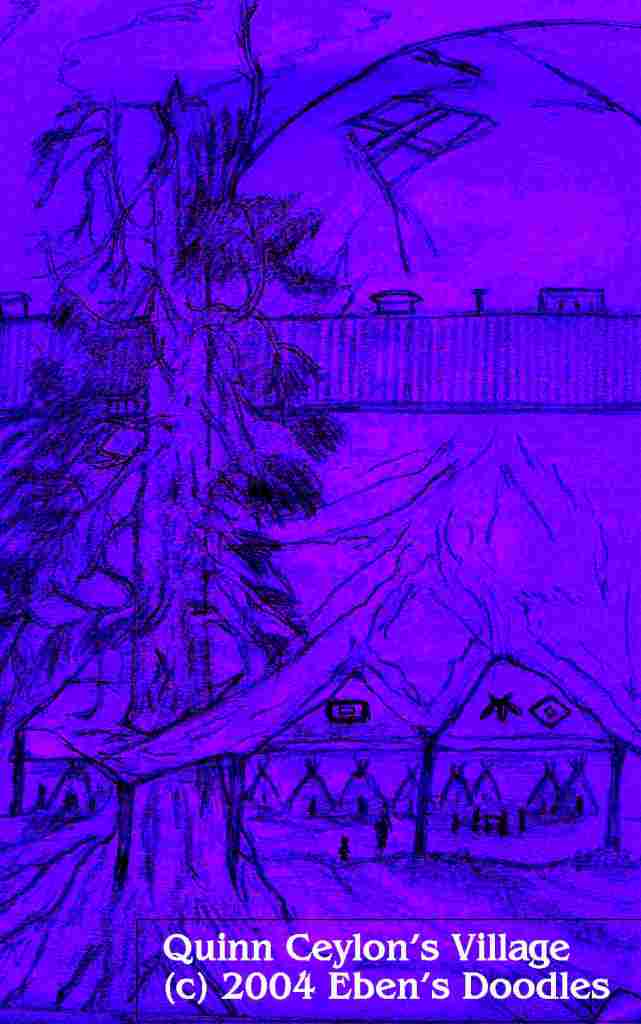
Quinn wondered, however, if that was so. He hadn't seen the other places, the rest of the world, so how could he know for sure if it was worth visiting or not? Besides, his spirit burned and thirsted greatly to know many things his father could not teach him. Who could teach him great things that might answer the desire in his heart? Were there wise men, were their elders, in other tribes, other lands, who could teach them what his spirit yearned urgently to know? To expect them to come to Ceylon was foolish, he knew. No, he could not remain at Ceylon indefinitely. His spirit impelled him to go from Ceylon in search, as soon as manhood came to him, and his father could keep him by the fire no longer.
When Quinn fell asleep at nights, his five starlike eyes gleamed, and he grew restless and tossed and turned on his sleeping mat. He had tried to shoot with his father's bow, but the arrows did not fly far enough to the target he sought to hit. He had tried his father's moccasins, but they always turned homeward and stubbornly refused to go any further. He had tried his father's medicine, but it was not enough to heal the nations, much less his own people who were, many of them, living not so long as they used to in the old days. He had tried seeing with his father's eyes, but he could see only as far as the horizon, and that was not far enough for him. He had tried...he had tried...
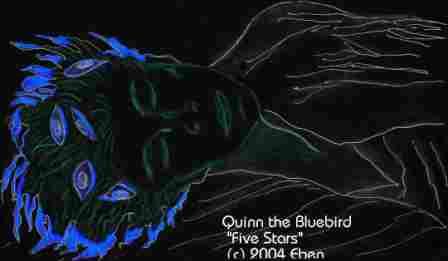
He asked his father what the white "sky meal" might be, and his father laughed. This time he knew about places outside Ceylon, having heard a man from the trader's riverboat describe "sky meal." "Snow, it is called" he said. "And the hard snow is called ice. You can eat it like meal of corn, but it will not nourish you. It will only make your teeth ache and chatter together!" His father then demonstrated, and they laughed.
Quinn marveled at such things his father had named and described for him. He thought about them for days. How had he dreamed such things he had never seen? He could not say. But he had seen them. He dreamed again in the night, and saw more unknown things--very large villages, that held hundreds, even thousands of people. And they looked different from the Shos-Shone and the Lakota. They spoke differently too, and he could not understand their speech. When he awoke, he asked his father about these people and their speech, but his father could only guess.
I have known such men pass by here, sailing their great, white, smoking canoe. I did not try to climb onto the canoe, for they shoot at us Shos-Shone and Lakota people. They don't like us on their canoes, for they must think we will steal their good things--but they are wrong.
We have our own swift canoes and our own good things. Here there is enough for everybody--we do not need what they have.
But they like our things--and trade for them sometimes. We give them things we can do without--and they are happy--such as the skins of our little brothers--they are not good at catching our little brothers. They don't like waiting in the trees where our little brothers come down to drink early in the morning and in the dark. So it is with these men of the north--they come and go, but never want to stay.
That is good. We could not live with such people, I think. It is good they have their own place far in the north and only come here now and then to trade us pretty beads, mirrors, and such for our good fish and fish oil and furs! They also like that black rock that burns--and so we trade them one sack full for a necklace of fine beads or, if we like, two mirrors!
His father continued, seeing that he had not answered Quinn fully. "They could be those who live around the big Shouting Mountain in the north, who worship a god we do not recognize, one that is a god of endless war, not peace. They go to war very often for their god, to take captives and burn villages, and increase their numbers of horses. We do not want dealings with them, for we are a peaceful people here. War is no good for the people! It is foolish to take other tribes' things and drive off their horses and cattle. We have plenty here, and why do such things? It will only bring attacks upon ourselves, if we take the good things of other tribes for our own. Why be so selfish and greedy?"
Quinn nodded, taking in the sensible wisdom of his father. His father taught him many good things like this, as fathers should teach young sons. He also taught Quinn the game of the Door not just for pleasure alone but for increasing his understanding. He used colored sands and pebbles, and Quinn practiced it until he was master of the game--though always one step short of finding the Key that unlocked the game's grand reward. Only then did his father stop his insruction, saying that the Key had never been won, nor would be--it probably didn't exist, and was only something to make the game savory to the tongue. What was the Key? No one seemed to know, because no one yet had mastered the game, it was explained to him.
Quinn had to think more about that. Why play the game if it was not going to produce anything? Why weren't the people disatisfied with never gaining anything from it? Why were they content to play and play and play at it and never really benefitting? He thought the answer might be, they were content to never find. They like to seek, just to pass the time that sometimes hung heavy on their hands, but if they ever found what they were seeking, they suspected they might not want it. No, for them, according to their own hearts' thinking, it better to seek but not find.
How could people be so wrong in their hearts? Quinn wondered, when the revelation struc him. They were dead people, who would never really come alive, in the path they had chosen to take in life. Why live life if they never grasped the Key of the great Game?
When Quinn came to understand this about his people, he wanted to venture forth all the more. He had to find out for sure if there was something more or not to life as his people lived it.
One day his father, who had noticed his son's restlessness and divined the cause, said to Quinn at the door of the lodge, "Son, you can go now if you like. You have reached an age old enough to see to yourself. We will wait for you to come back. Our door is always open to you. But you are a youth and need to run about on untrod trails, and you, more than all the rest of us here, mastered the great game handed to me by our fathers and elders. Take that knowledge and teach it to those people in the north that your heart wants so much to see."
Surprised at this wisdom in his father, Quinn was speechless, then very thankful and humbled. How had his father divined his heart desire so particularly? There was something more, even greater, tugging at his heart--but he could not speak of it to anyone. He had noticed something growing in him--a new power--which a medicineman's son might expect to see develop, but this power far exceeded anything known to his father's medicine.
His father smiled sadly, then turned his face away while continuing to speak. "You cannot sleep well at night. In the day I see your face is long. I know your heart wants to go. Follow your heart then, my son. We will wait for you here. I am growing old and the sickness of the ancients is eating the strength in my bones and blood, and I would go with you, but you must go without me. It is too long a journey. You would have to bury me on the way. Maybe some friends and brothers will go with you. But you must ask for yourself. I cannot send others with you to risk their lives for what I cannot see. It is a long road for one who is one-legged like you, with many dangers perhaps. I hope you do not die on the way, and we never hear of what happened to you so we can bring you back here to lie beside me in the earth!""
What could Quinn say to that? His heart was so full. His father's words were very wise on all acounts, though he had not divined the secret power he knew he now possessed. Taking his wooden shepherd's staff to lean upon, he went beyond the village, and stood for a long time looking north. But he knew he could not tell what it was like, unless he went and saw for himself.
On his return to his father's lodge, he said, "I will go in the morning." His father said nothing. His mother turned her face away. All the others, knowing better, kept silent. Nobody wanted to go with him to such strange places.
It was not a happy time, to see this one go away, however. Five Stars, the one-legged son of the medicine man, showed great promise already of mastering all the ancient healing arts of the people. He could have done them all much good if he stayed and lived as they had always lived, and dreamed as they had always dreamed. But now he was leaving them--for what they did not know or imagine. So they were very sad.
Nevertheless. the maidens and the warriors all came with gifts, to help him along on his journey.
Forgetting all the times they had made fun of his lameness, the young men proved most generous. He was given a fine horse, and new buckskins, and new beads and feathers and medicine pouch (and a black stone of great power to put in it), and many other fine things including the most beautiful, beaded moccasins. Looking like a great chief despite his youth (for Shos-Shone clothes were beautiful and noble beyond that of many other people's), he departed in the morning, when only the oldest women, who did not sleep better than a bird, rose to draw water, or light fires in the ashes, or just sit in their dooryards to warm old bones in the dawning light.
His tribe still hadn't guessed that Quinn followed a greater dream than theirs. What was it? In the math of the lost world, a googol had been a million billion to the monks who had handled such figures in their cliffside dovecotes and cells. Without knowing the exact value of a googol, Quinn somehow felt the number of sins and ills of the earth was that number--an incalculable, great sum of bad things all heaped up on the earth, poisoning it, killing it, making it barren, robbing it of happiness and peace.
The little areas the tribes had filled hardly compared with the huge areas they could not safely enter.
But what added to the evil and wrong of the world (for even in Ceylon there was evil and wrong going on in various ways) were the two stars he had seen in his sleep--one was golden, the other green, and both were powerful stars, casting their rays into the hearts of people in the north, south, east, and west. No one could escape them for long--and he too felt their rays touching him, tempting him, trying to turn him out of the path his heart knew was right for him
Besides resisting the pair of evil stars, he had to be very careful treading northward into unknown territories. Who would warn him of where not to go? The people he met might not like his tribe, and they might mislead him, and he would die. But his heart could not be denied. The whole suffering earth yearned for healing and restoration. It was diseased and sick, and he must find the Source of healing. His healing power coupled with his Shos-Shone people's healing arts were not enough, he felt. He himself was lame from birth--and nothing brought a cure, though his father chanted every healing chant and burned many prayer sticks over him as he was growing up. How many sand paintings had his fathe done as well--thinking that might do it? But no! He remained lame. And his father's wisdom, however great, had not stopped this one and that one from dying of the wasting sickness that made them bleed or lose their skin and suffer huge growths on their bodies or inside their bodies. It even poisoned their blood. That was the worst kind of death--to die so slowly and agonizingly--as the darkness spread visibly through the veins under the skin.
The Great Evil of the Ancients creating the world's dark stain was ever present. It could not be healed by any one tribe's wisdom, Quinn realized. He had to go and find if there was other wisdom that might contain the answer.
He could not remain in little, comfortable, inward-gazing Ceylon all his life like his father and his father's brothers and clan-brothers had done--no, he had to strike out into the wide world, and see if there was a way out for them. To remain home and see no change was the most cruel thing, to his mind. He felt he would die in his spirit if he did that. He could not stop the burning, urgent, questing within his heart and soul. It could not be denied now that he had grown to be a man. He was no man at all, he decided, if he denied the burning inside him.
He had, far as any man in the tribe before him, mastered the game of the Door, but that did not mean he had won the game and grasped the Golden Key. One who did that would, in a moment, heal and restore the broken Hoop of the World. He could not claim to have done that! Just in case somebody would do what he could not do, he had taken the colored sands with him in pouches, not to do the sand paintings of Shos-Shone medicine that meant nothing to strangers but to offer the game only to those he met along the way who were truly wise.
As Quinn rode along the shores of the Turtle Sea, he found he could not go the entire way on horseback. The distance was just too far and the rivers too many, with island after island, innumerable sandbars, bogs, marshes, and headlands that stood in the way. But there was a great canoe that came down those shores sometimes, and he hailed it from the shore. It drew near the shore, and when he showed he had furs to trade for passage, it let him board, particularly since a lone tribesman was no threat. The traders on board were a kind Quinn had heard about but never seen. They wore robes, not leather buckskins, and ate strange, oddly seasoned foods and spoke a strange, rapid, tumbling speech. Nevertheless, they knew how to barter as cunningly as any Shos-Shone or Lakota, and eagerly took the mink furs that Quinn had collected. They liked their quality very much, for Quinn had been careful not to spoil them when he killed the mink and took their life-giving meat.
Quinn was glad for the food his little, four-legged brothers gave him, and though he took their lives to preserve his own he thanked them for their sacrifices. Someday his body too would go to feed the eagles or the wolves--and that was the way he returned what he had been given. Nothing then was wasted.
Quinn, with his furs paid for, had the money for his fare on board the strangers' great canoe, and so he went aboard and the canoe soon began to move away from the village and down the Brazos toward the Turtle Sea. When they reached it, Quinn could not tell it at first, having never seen so much water, but he guessed the river had vanished in the wake of the great canoe when he saw there was no land on the horizon.
But the traders from the north did not like Quinn's looks very much, particularly when at night they saw the stars come out in his head and hair. It made them talk excitedly among themselves, and Quinn wondered if they were deciding to throw him overboard and keep his horse. He heard the traders did such things sometimes to tribesmen. But they would have to fight him for his horse and his life--he was not going to let them do this to him easily. He hated the strife, but he wanted to live to see if there was healing for the world. He could not die now, at the beginning of his journey. No, he would have to fight, if they attacked him. He sensed the evil hearts the traders had, which disturbed him all the more.
He lay uneasily on his sleeping mat on the deck, as the great canoe sailed northward, wondering if they would try to do him harm. He could not sleep, not while he lay on guard, and so the time passed and he found it harder to remain awake without some stinging weeds in his hands to beat his body with, as voyagers did to keep awake on long canoe trips to the sea to get the special shells that the tribe valued greatest of ornaments nd also used for barter.
Finally, he fell asleep, and when he awoke, he found he was still aboard. The traders had had their chance, and had done nothing to harm him.
He was not told, but they had seen mighty warriors of his tribe, standing twice their own height, slip aboard and stand guard round him hour after hour, so that they feared, every one of them, for their lives and would not dare touch even his medicine pouch or bow and quiver. How could they tell when the warriors--whose blue-shinging hair and garments blew in a wind they could feel--would next come back on board? Wen Nabi! they cried to each other in conference. Wen Nabi (by the Prophet!). They decided that this one was not worth their own lives, and gave him safe passage, so as to safely get rid of him at his destination!
From the first day on he did not fear them, and thought he would reach the northern lands safely. But it was then he felt his first grief over leaving Ceylon--he came to see that now he would succeed in his venture.
He would soon reach the north country, and go on alone. That sank in, and he wept for his father, his mother, his family lodge, his boyhood friends, and his tribe--knowing that he might not see them again for a long time. It is not easy to become a stranger to everyone around you.
Only his burning heart--and the five stars in his head and hair that glowed all the more brightly--not to mention the burning red stone and the burning black stone in his medicine pouch kept him company in the lonely hours and days to come. All three pulled at him--compelling him onward, but in different directions. Which way was best? he wondered. So many people ventured down the wrong paths--was he going to be like them? That was his fear, going astray. For that reason, he prayed earnestly for direction. "Father Spirit, guide my feet and give me counsel!" he prayed night and day.
